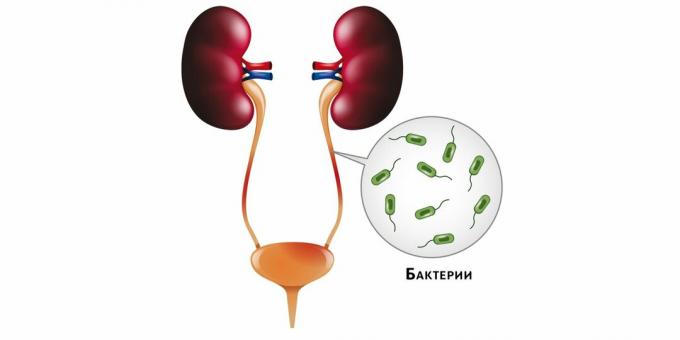What is pyelonephritis and how to treat it
Educational Program Health / / December 29, 2020
What is pyelonephritis and how dangerous it is
Pyelonephritis is inflammationKidney Infection. Symptoms and Causes kidney caused by certain types of bacteria. Most often, the infection beginsKidney Infection (Pyelonephritis) in the bladder or urethra and then up the ureters (the tubes that connect the bladder and kidneys).

If you suspect pyelonephritis, it is imperative and as soon as possible to consult a doctor. This is important for two reasons:
- If left unchecked, inflammation can permanently damage the kidneys. The consequences are extremely unpleasant - from edema and hypertensionassociated with disorders of fluid outflow, to renal failure.
- There is a risk that the bacteria that caused the infection will enter the bloodstream. Fatal blood poisoning may develop.
What are the symptoms of pyelonephritis
You can suspect pyelonephritis by severe pulling pain in the area loins. Unpleasant sensations appear from the side where the affected kidney is located. If both are inflamed, the whole back will ache.
There may be other symptomsPyelonephritis. Symptoms:
- High temperature (38.9 ° C and above). In children under 2 years of age, fever may be the only oneWhat is Kidney (Renal) Infection - Pyelonephritis? a sign of a disease.
- Chills.
- Painful sensations in the groin, abdomen, side.
- Frequent urge to use the toilet.
- Cutting, burning pain when urinating.
- Cloudy urine. Pus or blood deprives it of transparency.
- Urine with an unpleasant "fishy" odor.
- Weakness, fatigue.
- Nausea, sometimes vomiting.
- Cold sweat.
- Clouding of consciousness, confusion of speech. This symptom happensWhat is Kidney (Renal) Infection - Pyelonephritis? the only sign of kidney damage in people over 65.
However, the symptoms as such are still not enough to establish pyelonephritis: other urinary tract infections manifest themselves in a similar way, for example cystitis. An accurate diagnosis can only be made by a qualified doctor. And then - not right away.
How to treat pyelonephritis
Only with the help of a doctor. It is possible to hope that the body will cope with the disease on its own - such cases do happen. But it is dangerous: sometimes they die from complications of pyelonephritis. Therefore, go to a therapist, urologist or nephrologist.
The doctor will conductKidney Infection. Diagnosis and Treatment examination, asks you about your symptoms and gives you a referral for tests - primarily urine and blood tests. If it is important to clarify how badly the kidneys are affected, an ultrasound, X-ray, or computed tomography (CT) scan may be needed.
Pyelonephritis is treated antibiotics. They can be different, the doctor will select a specific drug depending on the results of the examination.
It seems to the patient that he has recovered already on days 2-3 of taking antibiotics. But you need to take medicine as much as the doctor tells you. As a rule, it is 10-14 days.
Sometimes antibiotics don't help. If the inflammation of the kidneys gets worse (in this case, they speak of a severe kidney infection), you will be hospitalized.
In a hospital, such pyelonephritis is treated with intravenous antibiotics and droppers. How long you stay in the hospital depends on the severity of the illness and how your body responds to therapy. As a rule, people feel better after 24-48 hours in the hospital. After that, you will be discharged, but you will need to take antibiotics for another 1–2 weeks.
In rare cases, if the inflammation has destroyed part of the kidney, surgery will be needed.
Reading now🔥
- What to do if the temperature is kept at 37 ° С
How to ease the condition with pyelonephritis at home
Be sure to ask your healthcare provider this question. He will most likely recommendKidney Infection. Diagnosis and Treatment following.
Make warm compresses
Putting a heating pad with warm water on your lower back, side, or abdomen will help relieve pain.
Attention: in any case, do not warm up the kidneys without a doctor's recommendation, and especially if you have not yet been diagnosed! It may be dangerous.
Take over-the-counter pain relievers if needed
To bring down the temperature and reduce discomfort, you can take a pain reliever based on paracetamol or ibuprofen. Aspirin won't work.
Drink more
Drinking plenty of fluids will speed up the elimination of pathogenic bacteria. But try to give up coffee and alcohol: they will make you run to the toilet more often and endure pain when urinating.
How to prevent pyelonephritis
The most importantKidney Infection (Pyelonephritis) Prevention - prevent pathogenic bacteria from entering the urethra (urethra), from where they can then enter the kidneys.
- Eat enough the amount of liquid. When you drink, you urinate, and when you urinate, the urethra is cleared.
- If you want to use the toilet, do not endure The need to restrain urination can lead to the growth of bacteria.
- Remember to go to the bathroom after sex. This is also important to clear the urethra.
- After defecation, wipe from front to back. This advice is especially true if you are a woman.
- Take good care of your hygiene. Shower and wash your crotch at least once a day.
Read also🚑💉💊
- 12 signs you have kidney problems
- Is it really impossible to sit on a cold one, otherwise you will get cystitis
- Why kidney stones appear and how to prevent it
- What to do if you have blood in your urine
- Urination after sex: who needs it and why



